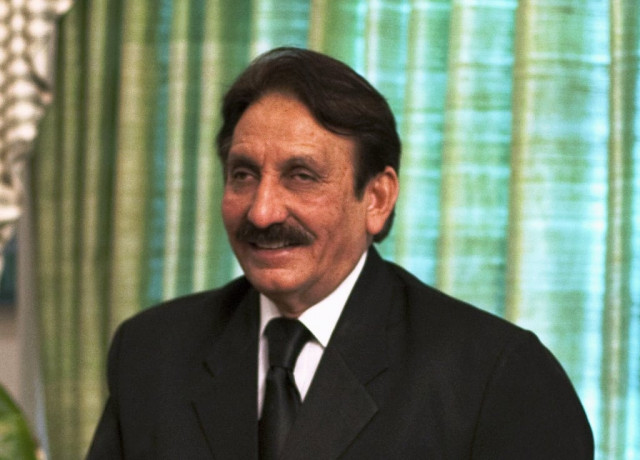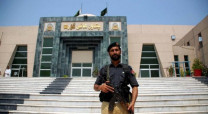Post-arrest bail: Judge excuses himself from Musharraf case
Following the code of conduct, the CJ earlier excused himself from hearing the case.

CJ Iftikhar Chaudhry. PHOTO: FILE
Another member of the three-judge Supreme Court bench on Monday refused to hear the plea against post-arrest bail granted to ex-military dictator General (retd) Pervez Musahrraf by Islamabad High Court (IHC).
Justice Nasir-ul-Mulk, who was heading the bench, excused himself from taking up advocate Aslam Ghumman’s application, seeking cancellation of bail granted to Musharraf by the IHC after he was arrested in the case of allegedly detaining over 60 judges of the superior courts.
“I am not going to hear this case. I cannot give you fixed date for next hearing. Office of the SC will put up your case before an appropriate bench,” remarked Justice Mulk after the applicant asked him to give a confirmed date for the next hearing.
Initially the court could not proceed with the case as Musharraf’s lawyer Ilyas Siddiqi was not present in the court. Musharraf had separately approached the court against the verdict of a single IHC judge who had rejected his pre-arrest bail and added terror charges in the case.
Earlier on July 8, 2013 Chief Justice Iftikhar Muhammad Chaudhry refused to hear the case and asked the SC registrar office to fix the case before a suitable bench.
On Monday the bench, also comprising Justice Sarmad Jalal Osmani and Justice Ejaz Afzal Khan, was to hear the plea against Musharraf’s bail.
It is relevant to mention that under rule IV of the Judges’ Code of Conduct, no judicial officer can hear a case related to him or his family.
Reportedly Justice Nasir-ul-Mulk had also been detained along with other judges following 2007 emergency.
Talking to the media, the petitioner Ghumman said the SC registrar office would fix the case for regular hearing as there had been many amongst the apex court’s 16 sitting judges, who had been detained after promulgation of emergency.
Citing Musharraf as respondent, advocate Ghumman challenged the June 11, 2013 judgment of the IHC that allowed the dictator post-arrest bail and deleted terrorism charges against him.
A division bench of the IHC had granted bail to the ex-military ruler as it maintained that there was no record to determine the role of Musharraf in the detention of over 60 judges after November 3, 2007 emergency.
Declaring the IHC order as illegal, unjust and arbitrary, the appellant asserted that it had resulted in grave miscarriage of justice. “The high court has not followed the dictums of Supreme Court in its true perspective,” he said.
“The judges of the high court could not delete section 7 ATA while deciding petition for post-arrest bail,” he said, adding that the deletion of the 7 ATA had prejudiced his case against Pervez Musharraf.
“The impugned order is fanciful, arbitrary and disrespectful for the entire judicial system,” he further said.
On August 11, 2009 Advocate Aslam Ghumman lodged an FIR with secretariat police in Islamabad against Pervez Musharraf for illegally and unlawfully detaining 60 judges of superior court after promulgating Emergency and Provisional Constitutional Order in the country.
Published in The Express Tribune, July 16th, 2013.



















COMMENTS
Comments are moderated and generally will be posted if they are on-topic and not abusive.
For more information, please see our Comments FAQ